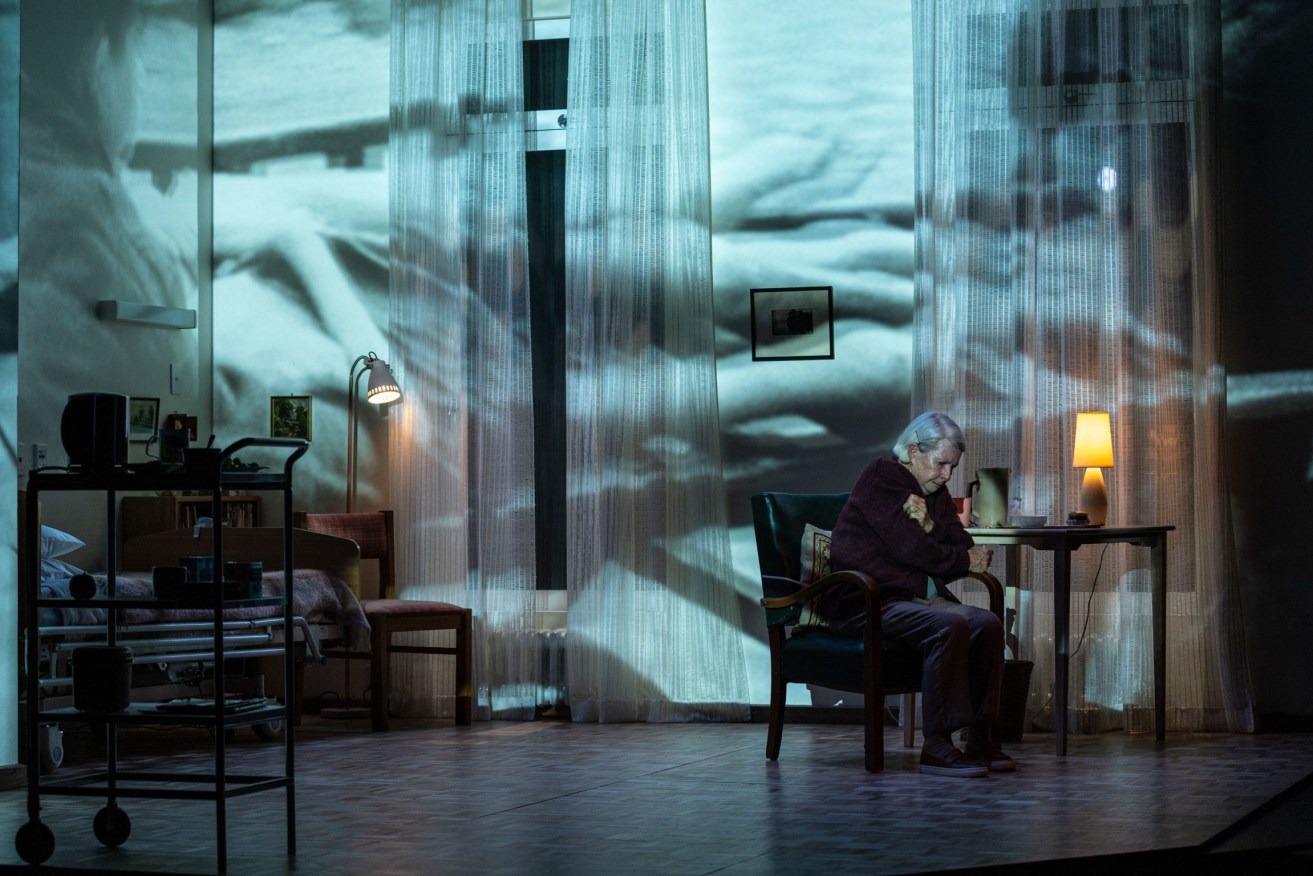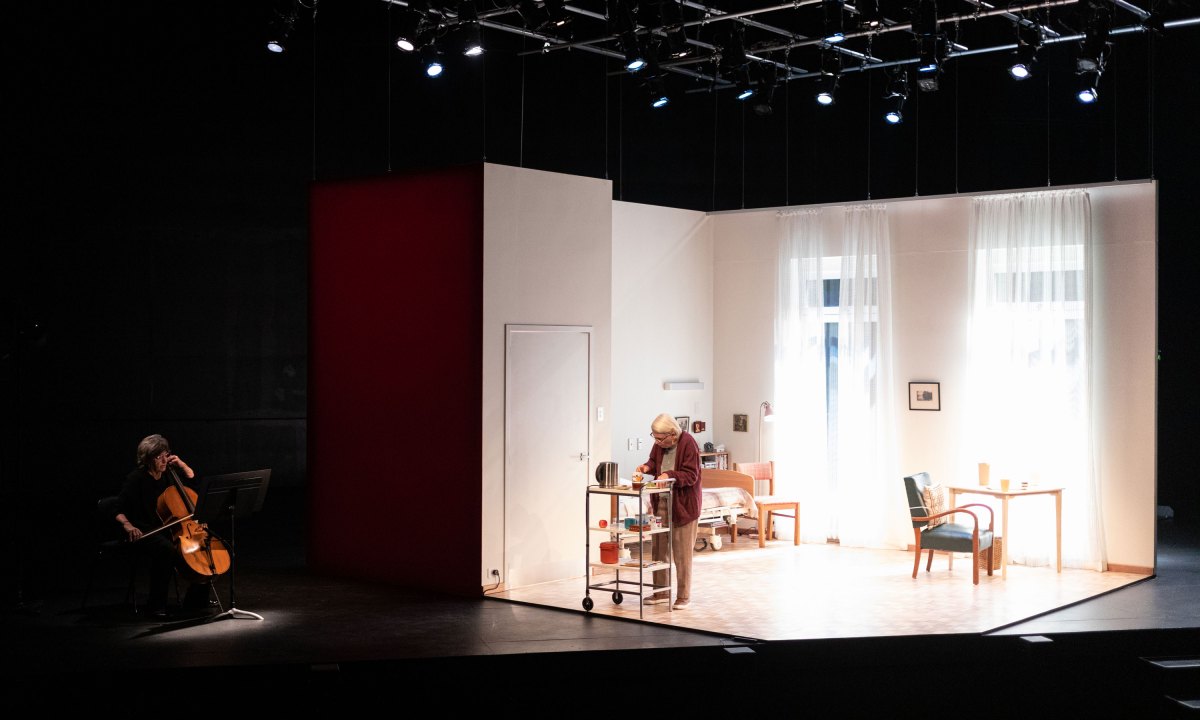Festival review: A German Life
Robyn Nevin gives a mesmerising performance as a woman looking back on an extraordinary life that saw her working in Joseph Goebbels’ Ministry of Propaganda in Nazi Germany.


A German Life: The bare walls of an aged-care room serve as screens for archival footage that punctuates the narrative. Photo: Andrew Beveridge
Is hindsight really as clear as the cliché suggests? How do we stop ourselves repeating the mistakes of the past when social change is so difficult to see from the inside?
Under Neil Armfield’s direction, Christopher Hampton’s play A German Life wrestles with these questions, delivering a production that is as much an eye-witness account of life under Nazism as it is a meditation on memory and history.
The events recounted by Robyn Nevin in her powerhouse performance as Brunhilde Pomsel reveal the shocking truth of how easy it is to be blind to the creep of fascism. To witness this incredible 90-minute monologue in 2021, with its alarming resonances to the present day, it’s clear that this production is so much more than autobiographical reportage. It is a contemporary call to vigilance – a warning wrapped in a history lesson.
With every accented syllable and twist of her handkerchief, Nevin inhabits the role of Pomsel, an elderly German woman who, in her youth, found herself employed as secretary to Joseph Goebbels.
With a slight osteoporosis hump, Nevin shuffles around Dale Ferguson’s austere set, a simple aged-care room that seems to float in darkness like a small cube of light, the bare walls serving as screens for the archival footage that punctuates her narrative. To the side, Catherine Finnis’s cello provides an exquisitely sombre soundscape composed by Alan John, her instrument even replicating the sound of air-raid sirens.

Robyn Nevin inhabits the role of the elderly Brunhilde Pomsel in A German Life, while Catherine Finnis’s cello provides a sombre soundscape. Photo: Andrew Beveridge
Hampton’s script draws on a sheaf of interview transcripts conducted when Pomsel was 102 years old. Her long and extraordinary life saw her witness first-hand some of the most pivotal moments of the 20th century. As a young woman trying to survive through the Great Depression, she made a living as a secretary, working for various employers, including Jewish business owners. The onset of the World War II, a boyfriend with Nazi sympathies, and her secretarial skills eventually brought her to the offices of Goebbels, the Nazi Minister for Propaganda.
While she claimed it was her knack for shorthand that led to her employment, rather than any ideological sympathy with Nazism, her position meant that she was an assistant to one of the most powerful and dangerous political figures in modern history.
This proximity, in conjunction with her claim that she was apolitical – just a naive young woman swept along by the socio-political fervour that surrounded her – makes her story strangely compelling. In her opening lines she muses that she has “forgotten such a lot, but certain things stick”. Yet as the play unfolds, what is left unsaid and the questions these silences raise begin to make their presence felt.
How much do we believe? Was she as naïve and oblivious as she claims?
Pomsel leads us through the details of her youth: her family and friendships, her work and love life. It’s a highly personal tale, only sporadically anchored in time with historical events. The Depression, the political transformation of Hitler from Chancellor to Führer, the rise the Third Reich – all of it gliding by as backdrop to her personal story, while she claims to have remained oblivious to the horrors perpetrated by the Nazis.
Pomsel recounts a life lived unaware of the political transformation occurring around her. Like the frog in the slowly heating saucepan, the water is boiling before the frog even registers the heat. Pomsel’s brothers put on their brown shirts and she went to work each day, apparently not realising the evidence of totalitarianism was already all around her: lack of free press, public anti-Semitism, persecution of homosexuality and political opposition. It’s only with hindsight that the tipping points became clear. How familiar it all seems.
But regardless of Nevin’s convincing embodiment of Pomsel, this is a performance that raises more questions than it answers. How much do we believe? Was she as naïve and oblivious as she claims? And even so, is being blinkered by your privilege an excuse for complicity?
Memory is fickle, but how far does Pomsel’s unreliability extend? She spent much of the war working as a professional propagandist, after all. A German Life presents us with a perspective that is unsettlingly ambiguous. This may be a first-hand account, but where is the truth?
Pomsel muses: “Mind you, nowadays, I don’t think people would be stupid enough to fall for the kind of nonsense we fell for. All that hot air, I don’t think you can get that past people anymore.”
Recent world events don’t support her optimism. Perhaps the most powerful message from A German Life is one best articulated by political theorist Hannah Arendt. Fascism doesn’t turn up in fancy dress. We need to pay attention.
A German Life is playing at the Dunstan Playhouse until March 14 as part of the 2021 Adelaide Festival.
Read more Adelaide Festival stories and reviews here.




